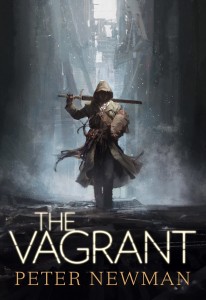Harper Collins, RRP29.99
April 2015
An unnamed man makes an illegal drug deal in a post-apocalyptic city, no sooner has he walked away from the deal than he is betrayed, such is our first introduction to the character The Vagrant in Peter Newman’s debut science fiction novel.* Thankfully The Vagrant has enough tricks up his sleeves that he continues on if not unscathed then at least free to continue his journey. Lucky, really, or else the novel would have been several hundred pages shorter than what it was.
Let’s start this review with a PSA or by noting that different readers will have different experiences with The Vagrant. At times it is clearly a first novel. Other times it reads like a computer game or RPG, which is not bad in itself but feels out of place within a novel. And for the first few chapters I wanted to step into the text, ring The Vagrant’s name out of him, hand it to the author compelling him to use it and stop with this uncomfortably distant narration.†
If, however, you’re a reader prepared to keep reading until the novel gets its legs under it—because you caught that something out the corner of your eye that piqued your interest—then The Vagrant offers up some very satisfying storytelling rewards for those persistent readers. The points above, while irritating at the time, are only minor elements of a much different whole. Elements which become increasingly less important the further the reader moves through this tale.
The rewards for continuing Newman’s novel are both, large in scale: the slow emergence of the world as it was and the post-apocalyptic world that is within the storytelling; and more intimate in scale: the characterisation and interpersonal relationships that are carefully drawn and enacted.
Post-apocalyptic landscapes are nothing new in the science fiction/fantasy genre, therefore, new iterations of these landscapes must be, at least for this reader, well characterised to avoid being disregarded in the inevitable trope fatigue. Newman’s post-apocalyptic world does not fall into the disregard pile. It is for starters not our world fallen into disaster but instead an alien world which has undergone a catastrophic event, and so is both familiar and alien. And the catastrophic event (the opening of a rift unleashing a plague of intelligences which need corporeal form to survive, and their spreading to engulf the world, transmuting it into a pitiless landscape where survival is a day to day thing) is frankly fascinating. It helps that some of the narrative voices belong to these very intelligences who are interesting characters on their own.
On the closer and more intimate scale (and a definite plus for this character focused reader) the interpersonal relationships between The Vagrant and those who become his travelling companions, a significant amount of which is non-verbal, provide locations for both philosophical and emotional exploration of the effects of the invasion and collapse of the world as they had known it. Or maybe, you know, I’m overthinking a little, but basically well created group of travelling companions who you become invested in and whose relationships (and by relationships I mean friendships) evolve throughout the book.‡
And a final significant point in a book world where series is seemingly the norm these days, The Vagrant does not end with an obvious sequel in sight. There is still clearly much more of this world that could be explored, and the possibility of further adventures for The Vagrant and his companions, however, as it stands there does not have to be another novel, this particular story is complete.
Though, as I stated above, some readers experiences may vary, if Science Fiction with expansive world building and strong characterisation is your thing then Peter Newman’s The Vagrant might be just the novel for you, and Newman the new author for you to watch.
*Apparently this novel is Science Fiction – personally I would have said Fantasy with Sci-Fi elements but I am but a reviewer and not the author so what would I know.
†It will also make you apologise to whomever you workshopped that piece with, where you were experimenting with not naming your character until five thousand words in, because it was the mood you were trying to create. Oh. That was only me. Never mind please continue to read the review.
‡I will give one piece of warning here, don’t get too attached to characters but know that within the bleakness there is also some comedic relief, a great deal of which is thanks to a rather stubborn nanny goat.


